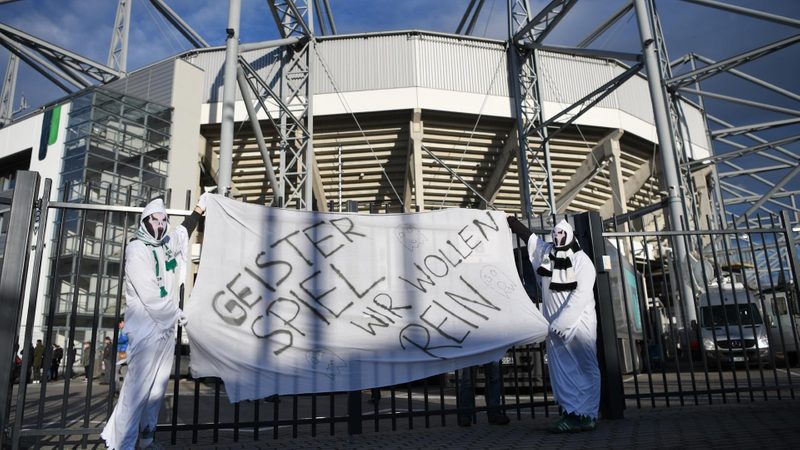
German football is famed for its vibrant fan culture and member-owned clubs, but as the Bundesliga braces itself for a major financial hit in the coming months, could the global pandemic put an end to fan power?
Many clubs are fearing for their financial futures in the crisis, prompting fresh calls to reform the long disputed "50+1" rule, which guarantees supporter influence and limits the power of wealthy investors.
"Other leagues are more flexible because they are more open to investors...which could put German football at a disadvantage," sports economist Christoph Breuer told DPA news agency.
The "50+1" rule is fiercely defended by German football fans, who see it as a bulwark against the commercialisation of football.
The rule ensures that a club's members -- usually its supporters -- hold majority voting rights, meaning that no individual person or company can gain full control.
Read | What is 50+1 percent rule and why Bundesliga fans hate RB Leipzig?
Its detractors claim that it scares away potential investors, whose spending power would provide a lifeline for clubs starved of matchday and TV revenues in the current crisis.
"Of course I can look for investors even with the 50+1 rule...but there would be many more possibilities without it," said Breuer.
- 'Crisis as opportunity' -
As iconic clubs such as Schalke and Werder Bremen warn of an "existential" threat to their financial security, calls for reform are growing louder.
"I think it's sensible to learn and to question the entire system in a crisis like this," Cologne sporting director Horst Heldt told Sport1.
Hanover president Martin Kind, who has long campaigned for the rule to be revoked, took a similar view in a talk show last Sunday.
"Football will change dramatically. It is always important to see a crisis as an opportunity and develop structures which facilitate sporting success with economic stability," he said.
Clubs like Wolfsburg, Bayer Leverkusen, Hoffenheim and RB Leipzig would emerge unscathed from the crisis due to their major financial backers, he argued.
Unlike Kind, who has repeatedly failed in his attempts to gain full control of Hanover, those clubs have managed to circumvent the 50+1 rule.
Read | Schalke players agree to forego wages in crisis
Red Bull-backed Leipzig have bent the rule by admitting only 17 club members since their founding a decade ago, while the other three have been granted an exception due to the longstanding involvement of a single, local investor.
All four clubs are widely despised by other German fans, and ultra-groups across the country hold regular protests against both Red Bull and Hoffenheim investor Dietmar Hopp.
- 'Populist demands' -
For most fans, the 50+1 rule remains an unassailable doctrine, to be defended at all costs.
In a statement on the pandemic crisis last week, supporter advocacy group "Unsere Kurve" warned against "kneejerk" and "populist" demands to overturn the rule.
"Collectively built foundations such as the 50+1 rule will bring advantages in the crisis, not disadvantages," said the group.
They added that "long-term solutions" were called for, and pointed out that they had for years campaigned for "sustainable economic policies in the clubs and a more fair distribution of TV income".
Read | Borussia Dortmund won't sell Jadon Sancho 'below his value'
Yet with the league suspended until the end of April, many clubs are facing short-term cash-flow problems which could prove decisive.
If the season is ultimately cancelled, clubs would lose a signficant chunk of their TV rights revenues, against which the league as a whole has no insurance.
In that case, opening the doors to investors may prove the "only chance of survival", as one player agent put it, speaking anonymously to Sport1.
Most clubs, he claimed, would not be able to survive more than four to five weeks under the current circumstances.
"In the end, the 50+1 rule will fall as a result of the pandemic."
Feature image courtesy: AFP / Inna Fassbender




















